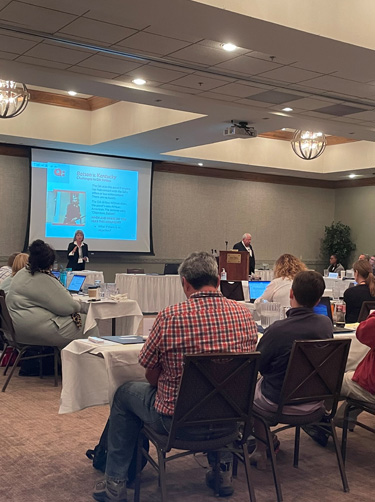
Associate Deans of the Wisconsin Judicial College, Judge Ellen Brostrom, Milwaukee County Circuit Court and Judge Michael O. Bohren, Waukesha County Circuit Court, present on Jury Trial Procedures during a session of the 2022 Wisconsin Judicial College.
The 55th class of the Wisconsin Judicial College convened at the Stone Harbor Resort in Sturgeon Bay Aug. 22-26. Fifty-six judges, including 24 new judges, spent the week focusing on the fundamentals of judicial work.
Professor Penny White of the University of Tennessee Law School joined the deans and faculty to provide a keynote on the challenges of maintaining judicial independence, the theme of this year’s College. Other sessions included Case and Calendar Management, Criminal Law Pretrial Problems and Procedures, Judicial Ethics, Evidence, Tribal Courts, Making a Record, Working with Interpreters, Judicial Dashboard Tips & Tricks, Jury Trial Procedures, and Sentencing. The Judicial College, presented by the Supreme Court's Office of Judicial Education, is one of many rigorous judicial education programs designed to ensure Wisconsin's judges are well prepared for the bench. The Judicial College provides a highly interactive learning environment to assist new judges with the transition from being a lawyer. Veteran judges also attend the college as part of their continuing judicial education and to help new judges acquire the skills and knowledge needed to serve as a judge.
Attendance at the Judicial College and other judicial education programs is required of new and experienced judges. A Supreme Court Rule (SCR 32) requires that a judge earn 60 approved credits each six years in office. One credit is roughly equal to a half-day session for most educational programming. Also during each six-year period, judges must attend the Criminal Law and Sentencing Institute and tour a state prison as part of an Office of Judicial Education program.

